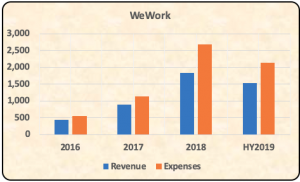Imagine this story. A kid grows up on a kibbutz in Israel where the sense of community is indoctrinated from a young age. The boy leaves school and goes to the Israeli army for 5 years before moving to New York. The young man enrolls at university and drops out to start three ‘failed’ businesses in rapid succession. The one failed start-up called Krawlers, which made baby clothes with pad inserts to make crawling more comfortable, was innovative but failed to gain much traction. Fast forward to 2010 and a co-sharing workspace company is founded in New York. Ten years later the group had 528 co-sharing offices in 111 cities globally and was valued at $47 billion pre the IPO. That’s the story of Adam Neumann and WeWork. An extraordinary tale of ambition and rapid scaling of a business model (which is hardly unique or disrupting).

How did WeWork manage to grow so rapidly over ten years? The playbook follows many other unicorns (private companies worth more than US$1 billion). First, you need to define a potential market for your goods or services that is ready for disruption (co-sharing office space) and ensure that this is really big. WeWork in its draft IPO 2019 prospectus defined the potential market as offices in 280 cities globally and the potential demand for its services as US$3 trillion (that’s US$3,000,000,000,000). Secondly, ensure that the founder and CEO is larger than life, a little crass and super arrogant (watch some Youtube videos of Neumann and you will notice a messiah like character with long hair and who has every answer and fact on the tips of his fingers). Thirdly, create a vision that is going to change the world as we know it. WeWork did this brilliantly by enunciating in its prospectus that its mission is to “…elevate the world’s consciousness…”. To scale a business such a WeWork you need serious money. That’s step 4. Neumann managed to convince numerous investors to invest billions into enabling WeWork to fulfill its mission. At last count, Softbank alone has invested ±US$10.6 billion in WeWork. Step 5 involves growing without consequences (worry about profitability later since profitability and growth are conflicting goals). Add in a bit of fun in the workplace like free beer on tap and compulsory tequila down downs after announcing retrenchments. Seems to be a winning strategy?
So what is WeWork’s business model in a nutshell? It’s quite simple actually. Lease office space in suitable locations on a long-term basis. Renovate the office space to attract millennials, centennials and some major corporates. Rent office space on a short-term, flexible basis to credit worthy tenants (WeWork’s average tenant lease term is apparently 15 months). Provide extraordinary service (coffee, refreshments, boardroom facilities etc.). I know the business model since I lease space in a co-sharing environment. It makes economical sense for me. I don’t have to commit for more than 12 months at a time. I don’t have to invest in office furniture, printers and shredders and have access to really interesting meeting rooms (one in particular has no chairs and I can write on the wall during meetings). I also get to hear some pretty interesting conversations during the day. Some humans cannot resist talking loudly whilst sharing intimate details of their existence.
WeWork in its prospectus strongly disagrees with my assessment of their business model. I had to read the entire prospectus, which by the way is 383 pages long, in case I missed a valuable life lesson. Some excerpts from this document…
“..we pioneer a space-as-a-service membership model…”
“…we are changing the way people work globally…we have disrupted the largest asset class in the world – real estate…”
“…technology is the foundation of our global platform…”
Reviewing WeWork’s historical financial performance and position is horrifying (refer attached for my Excel workings WeWork (Oct 2019). The business is losing money hand over fist. It reported revenue of US$1.8 billion in the financial year ended 31 December 2018 (FY2018) and seems on track to breach the US$3 billion mark in FY2019. Unfortunately, revenue growth has come at a huge cost namely; operating expenses of US2.7 billion in FY2018.

So why did potential investors baulk at WeWork’s proposed IPO valuation? I think there were four main reasons:
- The market has become weary of fast growing businesses which incur enormous losses with no regard for return on capital or cost containment. Think Uber, think WeWork.
- The market expects some degree of corporate governance and ‘doing the right things’. WeWork’s governance is shocking to say the least. Neumann has no employment contract with WeWork yet is the CEO. He had special voting rights to enable him to potentially control the company forever. Some of the executive titles are bizarre (apologies but I am ‘old school’). Neumann’s wife Rebekah (who is Gwyneth Paltrow’s cousin) was the Chief Brand and Impact Officer of WeWork. The co-founder of WeWork, Miguel McKelvey, is the Chief Culture Officer. Adam Neumann in the past acquired properties and then leased them to WeWork. In FY2018, WeWork paid rent to Neumann’s entities of US$11.6 million. Neumann has on numerous occasions in the past obtained low interest loans from WeWork. It came as no surprise that the WeWork prospectus revealed that the company “…may elect not to comply with certain corporate governance standards, such as the requirement that our board of directors have a compensation committee and nominating and corporate governance committee composed entirely of independent directors…”. Oh my goodness, does that mean the Neumann could sit on the compensation committee which decided on his salary and benefits?
- Property companies are subject to the vagaries of the economy. In good times, buildings are full and all is swell. In bad times, occupancies drop and some property companies go out of business. WeWork is not exempt from these market forces. In fact, its business model is even riskier. WeWork leases property from landlords for on average 15 years and then leases them to its tenants for an average of 15 months. That mismatch is cause for great concern in recessionary times. WeWork burnt US$2.5 billion of cash in the first 6 months of 2019 in its growth trajectory. To continue this, it will need to continue borrowing or stop expanding. Imagine the happy ending when the banks stop lending to WeWork and the USA economy enters a recessionary phase.
- The market has become less enamored with white male dominated unicorns who have faint regard for ‘rules’ that the rest of us have to abide by. There seems to be a lack of moral compass by some of these billionaire CEOs. Adam Neumann reportedly hired a private jet to transport him and his friends to Israel for a jaunt recently. The jet owner ordered the plane to return home immediately after the staff discovered enough dope on board to elevate the potential indiscretion from casual use to industrial dealing.
Take care out there. Regards from BeechieB.

Great article!